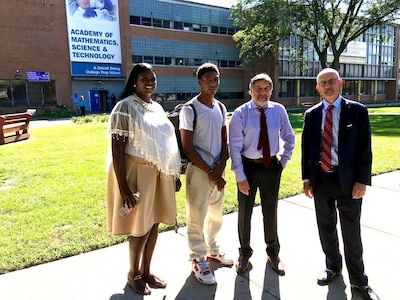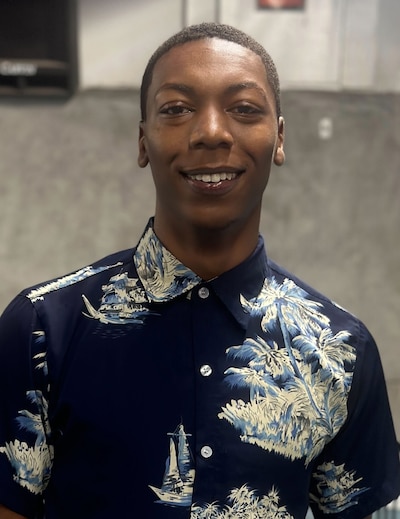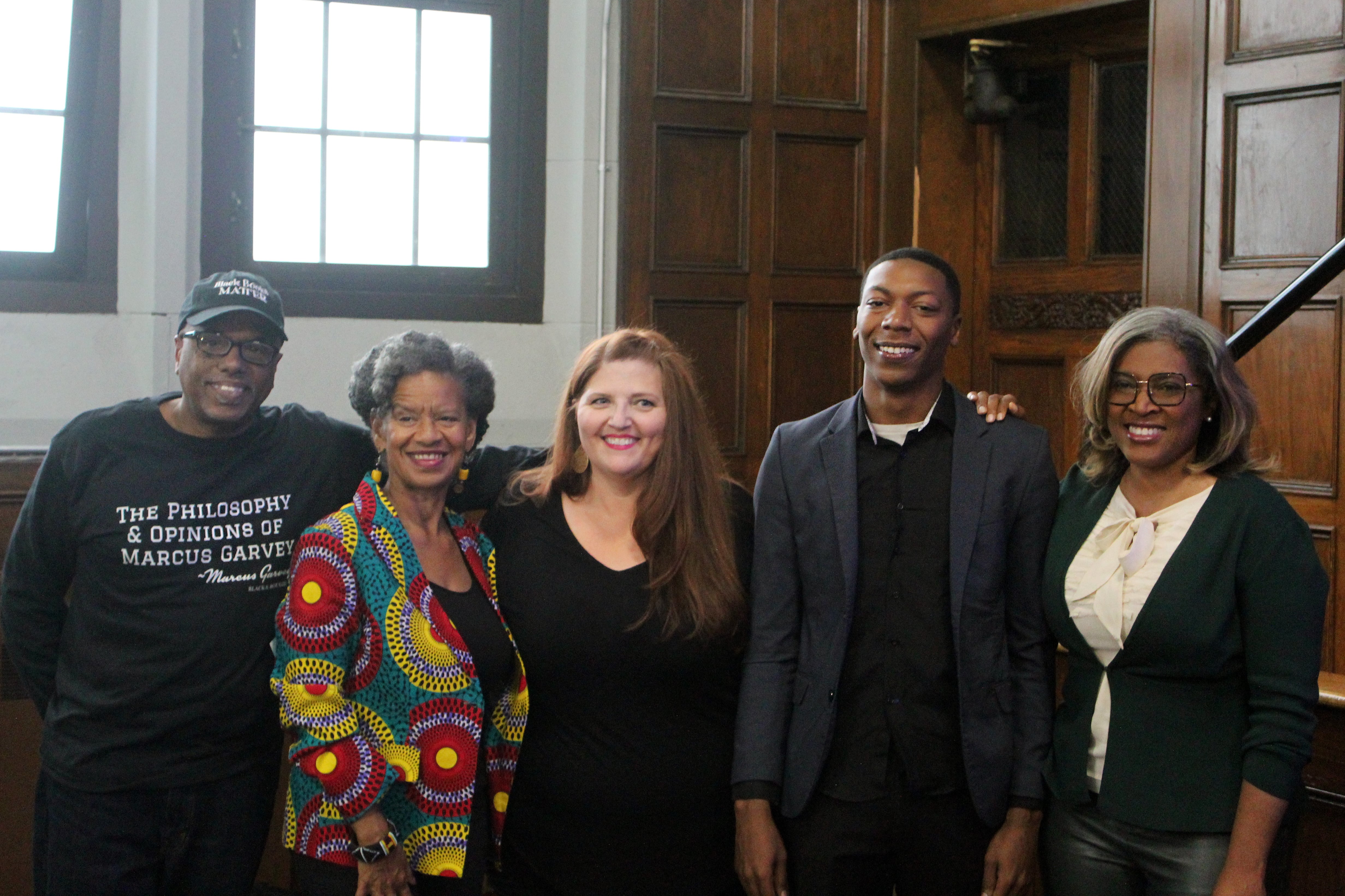For four years, Jamarria Hall rode the city bus 13 miles from his home on the west side of Detroit to Osborn High School on the east side, a nearly two-hour trip along Seven Mile Road.
He spent the time looking out the window and meditating on the state of his hometown, as the bus passed block after block of dilapidated houses and shuttered buildings.
Hall recalls the bus rides and his time at Osborn, one of the city’s lowest-performing schools, as “a waste of time.” Students were forced to learn in buildings in bad condition, with poorly qualified teachers and a shortage of textbooks. He remembers often seeing rodents crawling on the floor and having to teach class himself when regular teachers were absent.
His high school years would not be a waste, though. At age 16, Hall became the lead student plaintiff in a class action lawsuit against the state of Michigan, Gary B. v. Snyder, claiming that state officials had failed to provide Detroit students a basic reading education when they oversaw the Detroit school district between 2009 and 2016 under emergency management.
“Joining the lawsuit really gave me an outlet to be able to kind of tell our story,” Hall told Chalkbeat in an interview. “It felt like we had no control over the conditions and ecosystem that we were living in.”
A 2020 settlement in the so-called right-to-literacy, or “right to read” case called for the creation of two Detroit-based education task forces and earmarked $94 million in state money for the Detroit Public Schools Community District to support evidence-based literacy interventions.
Now, after years of delays, that money is finally in the school aid budget and headed to Detroit. And the two task forces have invited the community to weigh in on how best to spend it to improve reading education in the city.
The task remains huge: Reading scores among Detroit students have ranked among the lowest in the nation over the past decade and a half. In fourth- and eighth-grade reading, the Detroit district’s test scores on the National Assessment of Educational Progress rank near the bottom statewide and nationwide.
Hall, now 23 years old, is a public speaker and social entrepreneur focusing on education activism. And he remains connected to the effort he helped start. Most recently, he’s participated in those task force meetings about where the lawsuit money should go.
Hall spoke to Chalkbeat about how he got involved in the lawsuit, his vision for the future of Detroit education, and how he would like to see the settlement funds spent.
This interview has been edited for length and clarity.
Before you joined the lawsuit, how did you feel about attending school?
By the time I got to Osborn, school was easy. Like too easy. We never got homework. The classwork we were doing was work that I had done in prior years.

I only attended school and thrived academically because I knew I had to for sports. I knew if I wanted to be the best athlete, I had to be the best student-athlete. I really used those four years of high school to train and build a resume academically and athletically so that I could get into a Division I school, hopefully on a scholarship.
That was my objective, but to be honest, I felt like school was a waste of time. If I didn’t have basketball practice, most of the time, I wouldn’t go to school. Because it was like, I know the work. I can make it up in a snap of a finger. I know I’m not missing anything academically. And then the other thing that I’m truly passionate about — basketball — is not going on today. So why am I getting on the bus for an hour and 45 minutes to go to school?
Was there any other school you could have attended? Or was Osborn the only option?
If I wanted to go to the top schools, I could have.
I went to a charter middle school. So our feeder schools were (examination high schools) Cass Tech, Renaissance, and King. All of my classmates from middle school, that’s where they went. It was more an athletic choice (for me) than an academic choice.
What was going on in your life at that moment when you were chosen to be a plaintiff? What changed for you once you were a part of the lawsuit?
I bounced around to a couple of different states with different family members throughout middle school, so now in high school having stability, I was still kind of unstable.
Even though I had stability, I didn’t want to lean on it, because I wasn’t comfortable with it. And that wasn’t just in my home, or my family. It was just me as a young adult trying to find myself as a young man. I found the lawsuit, or it found me.
James Baldwin has an amazing quote. He says: “As one begins to become conscious, one begins to examine the society in which he is being educated.”
Being able to connect with (attorney Mark Rosenbaum) and being able to just tell my perspective on the educational atmosphere at that time … was great. Just talking to somebody who also understood that these things were wrong, sharing that made me feel heard and seen.
Why did you think the lawsuit was so important at the time?
It was presented to me that we were going to go after a minimum requirement for quality education as a constitutional right. That sounded amazing, and for me, it was really simple. We obligate children to go to schools, but we don’t obligate schools to teach.
But to be honest, I never thought past what was that minimum requirement. So that’s when the conversation started to happen about what would that look like. And that’s how it came up to be reading.
I didn’t care too much about reading. I could read, but I never thought too much of it until it kept being brought up within the lawsuit, and then I started to see the relevance of it.
If you can’t read, then you can’t do simple things such as fill out a job application, vote or be a part of the democratic process. This plays a part in unemployment. This played a part in society’s impacts and problems that were going on at that time.
What is motivating you to stay involved in this cause?
Figuring out the solution. What are we going to do to make sure that this doesn’t happen again? That’s the most important part because we have seen a lot of lawsuits where those same issues play out in different facets, because the people who were defendants in the case are now the same people who provide solutions for the community.
I want to change education. If you look at the last century, education has not changed at all. The classrooms, the way we teach, the building foundations, the one teacher to 30 students in a class — all these things have not changed at all. Our students are actually worse off than our ancestors were when they were segregated. In the age of artificial intelligence, our students are nowhere near as proficient as we need to be.
What role do you think students should play in deciding how the district spends the settlement money?
This class action lawsuit wasn’t just for current students. It was for the students before us. And the students after that.
They need to at least be at the table. I attended four of the six task force community meetings, and the other two, I had representatives go in a team. There were no students.
We have to be a part of the conversation, and we have to understand the conversation that we’re being a part of. A lot of people still don’t even understand the importance of the lawsuit, what happened, and what we were fighting for.
We have to focus on young people and find out how to get them engaged and involved in their own education. Some of that money should go to employ these students, especially when we have teacher deficits and teacher shortages. We need to use this as a precedent to create a student-to-teacher pipeline that is sustainable.
There’s a program I like called the Young People’s Project, where students are paid as organizers within their community, teaching math to younger students. We know a lot of students have the option between providing for their families or going to school. A program like that would bring both of those options together.
How prepared did you feel for college? What was that feeling like when you were in your first college seminar? What have you struggled with in college?
I definitely felt prepared — until I got there. “If I have the highest SAT score in my school, I’m second in my class, if I’m going and not being proficient, then nobody is” was kind of the mindset that I had within my mind.
I wound up going to a community college and taking remedial classes. So I was thinking, “If I went to university, how far would I have been behind if I’m already behind at a community college?”
It was really just a huge reality shock. I always felt like, “OK, after I get out of Osborn, I know I can turn it back on.” But when a professor asked me for a 500-word essay, it made me realize that in the past four years, I hadn’t even written anything remotely close to that. I haven’t had to work that hard or actually challenge my mind at that point.
How do you feel about your education journey now, versus when you were experiencing those initial challenges with community college?
I think it was all for a reason. Times have changed drastically to where we no longer feel like we only can get an education in school. There are so many different outlets out there now to not only get certified education, but to get experience. And experience is one of the best forms of education, especially for someone such as myself, and someone from poverty.
My world has been opened up from the Algebra Project, from Earn Your Leisure, from multiple connections to different organizations.

I’m really trying to set a precedent for young people, because a lot of young people when they see me feel like I have it all figured out. But I’m still very connected and close-rooted to the grassroots. I don’t have a doctorate. I don’t have a bachelor’s degree. I don’t even have an associate’s degree. But I have qualifications that can get me there.
So understanding and letting them know that there isn’t one route to success, that was important for me, because I used to believe that the only way I was going to be successful was if I took this certain specific route, because that’s how it was taught to me my whole life.
You mentioned culturally relevant curriculums. What do you think could actually work for Detroit students that hasn’t been tried before? What do you think culturally responsive lessons would look like and mean for students here?
It would be a very unique and different approach. A lot of our students know about things that they shouldn’t know about but don’t know about things that they should know about. So when we say those students know about all the lyrics to rap songs, but can’t read a book, or can’t read on grade level, how can I bring that rap song into the classroom to help this student be or get more proficient on their grade level?
Even if that means letting them do a performance, create lyrics, or do some type of engagement. Maybe even a process where they act as producers, or they are directors. So now these students are getting experience being judges and hosts, doing these different things that they are having fun with, but they all have a script that they have to read. Now this is a component where they’re actually learning but they’re having fun at the same time.
What is your message to the next generation of student activists?
You already have the power. Power is not something that you obtain solely through education. It’s once you understand who you are and what you are.
I always tell them: You are the future, but you are also the present. So don’t just think you can lollygag around. Always think about, how can I make a change? How can I be productive? How can I make an advancement for society, not only for myself and my family but for others also?
I push a lot of social entrepreneurship on students because a lot of young people are becoming entrepreneurs, but they aren’t familiar with social entrepreneurship. So even students who often do nonprofit work, just letting them know that being woke doesn’t mean being broke. So make sure that you’ve taken care of yourself or your family, and making the most of the knowledge that you already have by just being yourself — a young person.
Ethan Bakuli is a reporter for Chalkbeat Detroit covering Detroit Public Schools Community District. Contact Ethan at ebakuli@chalkbeat.org.






